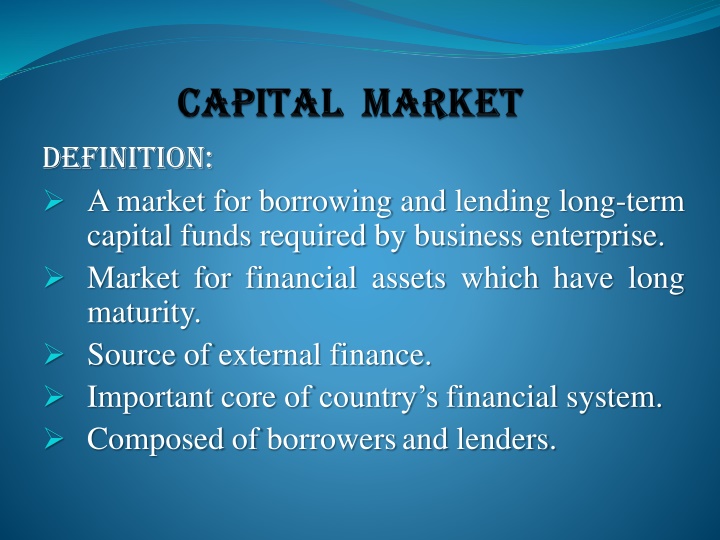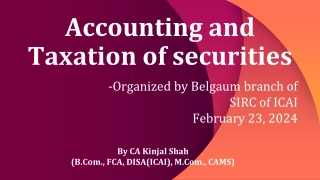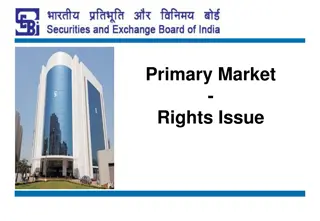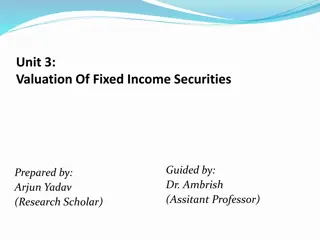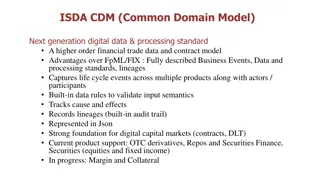Floatation of Securities in Business
Floatation of securities in business includes shares, debentures, loans, and bonds, each serving as a source of capital with distinct characteristics and purposes. Shares represent ownership in a company, debentures are debt instruments, loans involve repayment with interest, and bonds are long-term promissory notes traded on the exchange. Understanding these securities is essential for businesses seeking capital financing.
Download Presentation

Please find below an Image/Link to download the presentation.
The content on the website is provided AS IS for your information and personal use only. It may not be sold, licensed, or shared on other websites without obtaining consent from the author.If you encounter any issues during the download, it is possible that the publisher has removed the file from their server.
You are allowed to download the files provided on this website for personal or commercial use, subject to the condition that they are used lawfully. All files are the property of their respective owners.
The content on the website is provided AS IS for your information and personal use only. It may not be sold, licensed, or shared on other websites without obtaining consent from the author.
E N D
Presentation Transcript
DEFINITION: Amarket for borrowing and lending long-term capital funds required by business enterprise. Market for financial assets which have long maturity. Source of external finance. Important core of country s financial system. Composed of borrowersand lenders.
Securities Market Security Prices Participants Location
FUNCTIONS OF CAPITAL MARKET Allocation Function Market attracts new investors who are willing to make new funds available to business. It allocates funds by a system of incentives and penalities. Liquidity Function Buyers and sellers can exchange securities at mutually satisfactory prices. Thus better liquidity for securities. Other Functions Indicative function Savings and Investment function Transfer function Merger function
The Indian Capital Market is composed of the following: 1. The Gilt-edged market 2. The Industrial securities market Gilt-edged market: - known as Government Securities Market Industrial Securities Market 1. Primary market 2. Secondary market
Securities Exchange Board of India(SEBI) To prevent the malpractices by companies, brokers and merchant bankers, government constituted SEBI in April 1892 for regulating and promoting the stock market in the country. Main Objects of SEBI -development and regulation of stock market -promote fair dealings by issue of securities -provide protection to investors -code of conduct for brokers, merchant bankers etc., -check on preferential allotment to promoters -prevent violation of rules -verify listing requirements -promote healthy growth of security market
Stock exchange regulation Stock brokers regulation CIS regulation Investor protection Others performing functions and exercising powers under the provisions of the capital issues Act and securities Contracts Act, 1956. -levying fees or other charges -Conducting research -performing other functions as prescribed by the government.
Meaning : -is one in which new securities are offered to the investing public for the first time. -alsocalled New Issue Market. -provides opportunities for new investors to start new enterprises. -existing companies will be in a position to expand their activities. -promotion of partnership firm into Public Limited companies or merger of companies or facilitates buy-back of shares.
Origination: - Investigation - Analysis - Processing of new proposals Underwriting - Types - Institutional like IDBI, ICICI, UTI, SBI --Non-institutional like any NBFC -Advantages Distribution -Prospectus -Offer for Sale -Private Placement -Rights Issue -Bonus Shares -Book Building
Meaning : - A specialized marketplace that facilitates the exchange of securities that already exists. - known as Stock Exchange or the stock market. Definition : According to Sec 2(3) of the Securities Contract Regulation Act 1956, the stock exchange has been defined as any body of individuals whether incorporated or not, constituted for the purpose of assisting, regulating or controlling the business of buying, selling or dealing in securities .
Common trading platform Mobilisation of savings Safety to investors Distribution of new securities Ready Market Liquidity Capital formation Speculative Trading Sound price setting Economic barometer Dissemination of market data Perfect market condition Seasoning of Securities Efficient channeling of savings Platform for public debt Clearing house of business information Evaluation of securities Investor education
